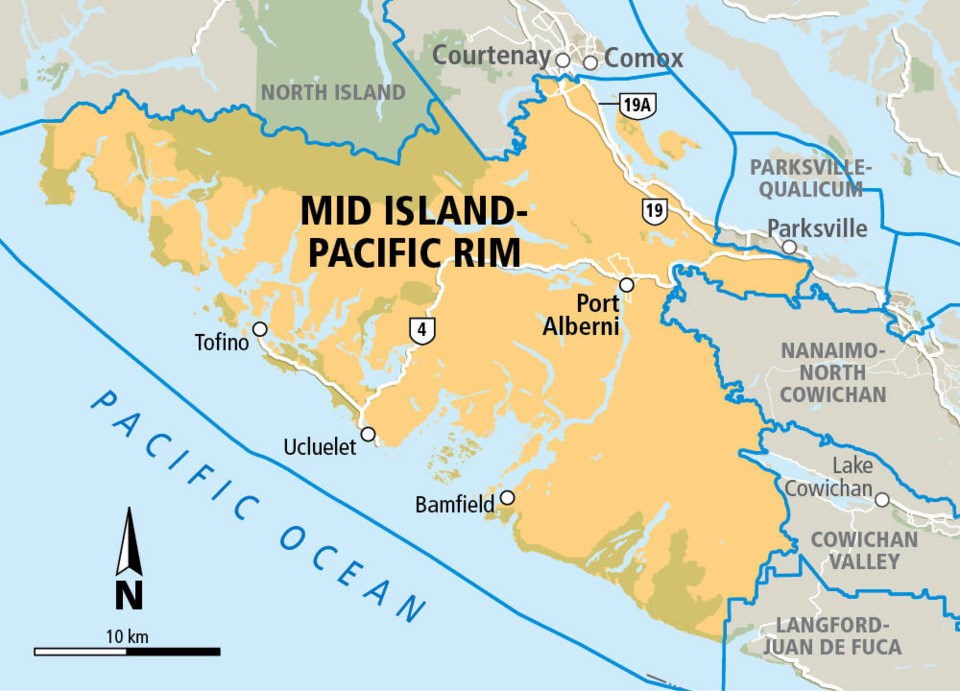 As the Oct. 24 provincial election approaches, Jack Knox is looking at Vancouver Island’s 14 ridings and some of the issues affecting them. Today: Mid Island-Pacific Rim.
As the Oct. 24 provincial election approaches, Jack Knox is looking at Vancouver Island’s 14 ridings and some of the issues affecting them. Today: Mid Island-Pacific Rim.
By reputation, the Hump, the steep climb on the highway to Port Alberni, does more than separate the east side of Vancouver Island from the west. It separates one way of life from another.
To the east, the vast majority of the 870,000 people on Vancouver Island are squeezed into an almost unbroken ribbon of humanity stretching from Campbell River to Greater Victoria. To the west, a more sparsely populated land of loggers and mill workers, toiling away against a backdrop that is more forest green than asphalt grey. By stereotype, those on one side of the Hump steer golf carts, while those on other drive pic-up trucks.
That’s an over-generalization, of course: Some of those on the west side, the ones from Tofino, cruise around not in pickups but in Westfalias with surfboards strapped to the roof.
Mid Island-Pacific Rim straddles the Hump, but in a way that avoids the larger towns on the east side. It stretches into the strait to take in Denman and Hornby Islands, but stops just short of Courtenay, Qualicum Beach and Parksville.
That leaves the riding full of people who might be more attuned to the natural world. Whether they’re from huntin’ and fishin’ Port Alberni, mountain-biking Cumberland, leafy Hornby or ocean-hugging Tofino and Ahousaht, this is a place for those who love to get outdoors, who might care more about the wild world around them than they do about the communities in which they live.
At its outer edge, the riding takes in some of the most breathtaking places in Canada: the West Coast Trail, the Broken Islands, Pacific Rim National Park Reserve. This is the Supernatural B.C. that has Australian tourists reaching for their cameras and Trudeaus grabbing their wetsuits.
But that supernatural image, says the B.C. Wildlife Federation, a bit of a mirage. Just in time for the election, the group has released a report that paints a picture of 30 years of underfunding and neglect when it comes to the government’s stewardship of the province’s animal kingdom and the habitat that supports it.
“Mirroring habitat loss and degradation, we have moved from abundance in fish and wildlife to scarcity in a generation of people,” the report concluded. “We now have endangered steelhead, endangered caribou, record low salmon and moose populations, and declining sheep and mule deer populations in parts of the province.”
It speaks of human encroachment, of the 700,000 kilometres of roads that now crisscross the province, and of policies that favour resource extraction over grizzly bear conservation. Since the 2017 election, wins such as the commitment of $43 million to salmon restoration have been offset by losses such as the failure to bring in endangered-species legislation.
These worries are not specific to Mid Island-Pacific Rim, of course. It’s just that the riding is one of those where people pay attention to this stuff. That’s not necessarily the case in the urban centres where the election will be won and lost.
Maybe that’s why we haven’t heard much about topics such as wildlife in this campaign.
The NDP’s platform makes a brief reference to co-operating with neighbouring jurisdictions to protect wildlife corridors. The Liberal platform speaks of working with others governments and groups to restore wildlife populations, without offering specifics; it does promise to create a minister of fisheries and coastlines, and to adopt “robust” steelhead and salmon conservation measures. The Greens’ platform, released Wednesday, includes such measures as more money for wildlife conservation, habitat protection and habitat acquisition, plus an endangered-species law.
The parties generally have more to say about forestry, a contentious issue in a riding in which the industry is both at the heart of the economy and at the centre of the conflict that grew, a quarter century ago, into the War in the Woods. Meares Island, Clayoquot, Carmanah, Walbran — the equivalent of Civil War battlegrounds — can all be found within Mid Island-Pacific Rim.
This summer, after the Fairy Creek watershed near Port Renfrew was left off a government list of old-growth forests needing protection, another blockade went up. The protest hasn’t drawn the same attention it would have in the past, though. Some of the old forest campaigners complain, albeit quietly, that their cause has been left in the back seat as today’s environmentalists devote their energy to LNG, Site C and the Trans Mountain pipeline. On the other side is the argument that today’s players — companies, enviros, Indigenous communities — have found more value in collaboration than confrontation.
It’s against this background that five candidates are vying for the seat being vacated by 15-year New Democrat MLA Scott Fraser, B.C.’s Indigenous relations minister. Tofino’s Josie Osborne, who enjoys a public profile much greater than might normally be expected from the mayor of a community of 2,000, has succeeded Fraser as the NDP’s nominee. She faces Liberal Helen Poon, a Port Alberni councillor; the Green’s Evan Jolicouer, a political newcomer; Libertarian Rob Clarke, who also ran in 2017; and independent candidate Graham Hughes.
jknox@timescolonist.com
Candidates
- NDP — Josie Osborne
- Liberal — Helen Poon
- Green — Evan Jolicouer
- Libertarian — Rob Clarke
- Independent — Graham Hughes
2017 results
- NDP – Scott Fraser 12,556 (49.05 per cent)
- Liberal – Darren DeLuca 6,576 (25.69 per cent)
- Green – Alicia LaRue 5,208 (20.34 per cent)
- Conservative — Julian Fell 878 (3.43 per cent)
- Libertarian — Rob Clarke 294 (1.15 per cent)
- B.C. Refederation — Dan Cebuliak 86 (0.34 per cent)
- Voter turnout: 63 per cent



